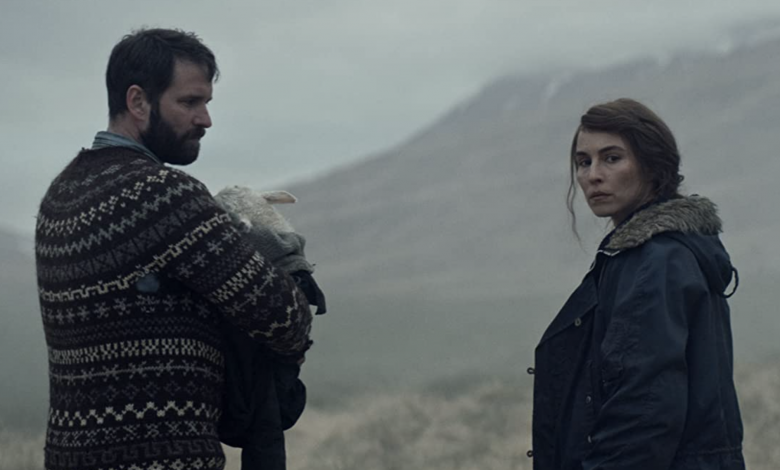Lamb Review

Abigail Lee ‘25 / Emertainment Monthly Staff Writer
In Lamb, parenthood is contradictorily explored as a resistance against nature. What is universally thought to be the most instinctive relationship—that of a parent and their child—becomes a troubling contestation of the natural elements.
Set on an Icelandic farm, Valdimar Jóhannsson’s directorial debut centers on a childless couple who spend their day-to-day lives tending to a flock of sheep. The film begins with few words or actions as it establishes the routines of Ingvar ( Hilmir Snaer Gudnason) and Maria (Noomi Rapace). The mundane activities of the characters, the impersonal shots of the Nordic scenery, and the sparse dialogue develop a sense of emptiness that hints at an attempt for eerie tonality.
The succinct pace is uninterrupted when the couple discover, to their wonder and confusion, that one of the sheep has given birth to an amalgam creature: an infant with the head of a lamb and the body of a human. Jóhannsson stays true to his muted directorial style, keeping the viewer deliberately at a distance, even as the characters find themselves at the heart of a fantastical aberration. There is little insight into Maria and Ingvar’s internal thoughts; the emotion that is conveyed to the audience— Ingvar’s brisk tears in one scene, for example– links back to an easily inferable but unexplored theme of childlessness.
Maria and Ingvar’s response to the lamb-child can’t be described as a welcome, but as a claiming that happens with a presumptuousness and desire that risks headiness. They scoop the child up from the barn floor and transport her to a crib in their bedroom where they nest her into a blanket. The couple embrace the child, who they name Ada, in place of the austerity of their lives, but it is not so simple. The child is not theirs, and she is not so easily extricated from the frigid landscape beyond the domesticity of the farm.
Lamb is interested in the tension between the personal wants of parenthood and the external factors that break the lens of narcissism. Ada is the source of newfound, but compromised happiness. There is an underlying fear of a disturbance that could turn this story into a nightmare.
Yet, what might have been the most interesting component of the film also becomes its weakest. The steady, laconic nature of the film suggests that perhaps Jóhannsson is relying on the accumulation of moments to create investment into the story. However, the scarcity of detail and specificity results in the audience’s alienation from the characters. The film seems so occupied with slowly building a sense of impending loss or devastation that it neglects its central curiosity, Ada.
Lamb fails in its inability to invoke emotional connection, and its subdued tone belies a directionlessness that subjects the movie to banality. What a disappointment for a film about a rare and impossible spark of creation.